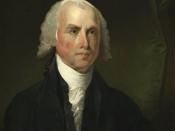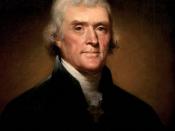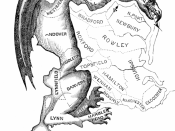On March 4, 1801, the first Democratic-Republican administration took office. James Madison, of Virginia, was appointed Jefferson's first secretary of state. The President, in his inaugural address, showed a desire to bring about unity of action between the Republicans and the Federalists.
The administration of Jefferson (Democratic-Republican, 1801-1809) met with public approval. The finances of the nation prospered. Material resources increased rapidly. The party in power successfully antagonized the Federal idea of a state church. The naturalization laws were modified so that a residence of five years and an application three years prior to admission gave the privilege of citizenship to aliens.
The purchase of Louisiana, in 1803, was a notable feature of Jefferson's first administration. One of the most important events at the close of his first term was the ratification of the Twelfth Amendment to the Constitution (1804), whereby each of the state electors was relieved from voting for two candidates for President, as had up to that time been required.
At the end of 1805, the Democratic-Republican party, formerly anti-Federalists, began to use the name "Democrat" as the party designation.
During the same year, owing to the struggle on the European continent between Napoleon and the allied powers, Jefferson inaugurated a vigorous foreign policy. By a second Embargo Act, in 1807, Congress ordered the detention of all American vessels in American ports, thus cutting off commercial intercourse with England and France. This law was afterward repealed, taking effect from March, 1809. Jefferson declined nomination for a third term.
The Democratic administration of Madison (Democratic-Republican, 1809-1817), was, in general policy, in harmony with the principles adopted by his immediate predecessors. The controversy with England was still pending. That country and France were still at a deadlock, and disregarding neighboring neutrals.
In 1811, the majority in Congress...


